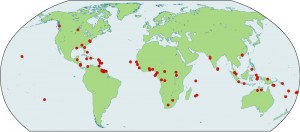
The vocabulary of creole languages has many terms that share their roots and meaning with other words in another language, usually from the parent culture. The grammar, although it has similarities with the grammar of the language of the parents, also has its own characteristics. In the majority of creole languages, the vocabulary is fed by the dominant group, and grammar of the subordinate group. For example, the creole of Jamaica is characterized by an influx of English words used in an African-based grammar.
Many of the creole language born in the last hundred years were the product of the overwhelming European maritime expansion. Like many unofficial languages, creole languages have been somewhat devalued and treated as dialects … And many, victims of prejudice, fell into extinction.
The term creole comes from the French word “créole”, which has close equivalents in Spanish (“criolla”) and Portuguese (“crioulo”). All share the same root of the verb “criar” (to raise), and the same origin of the word explains why the term “creole” was chosen to refer to this type of language.
As mentioned, the majority of creole languages arose as a result of trade routes, and that is why they are focused around the Equator and other areas close to the seas: on the shores of America and Haiti, West Africa and India, as well as in Southeast Asia to Indonesia, Macau, Malaysia, Philippines and Oceania.
But although they are all creole, they are all different from each other, so you have to know exactly what points you need to address when you are translating.
For more information, see “Translation Services.”
(Spanish version: https://www.trustedtranslations.com/que-es-el-creole-2011-01-26.html)





